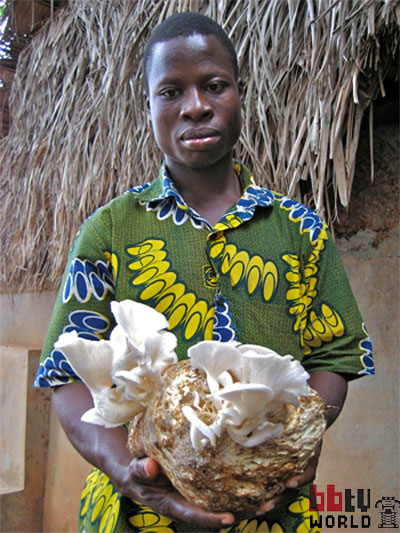In this installment of Boing Boing tv's ongoing BBtv WORLD series, I travel to the West African nation of Benin to visit the Songhaï Center, a green tech project designed to develop a new generation of "agricultural entrepreneurs," and foster economic sustainability.
Benin is nestled between Ghana, Togo, and Nigeria along the continent's midwest coast — this shore was historically known as the "Slave Coast," and Benin was a major center in export of slave labor to the Americas. Today, Benin's people are struggling with a cultural shift from a traditional, mostly agrarian society, to a more urban, industrialized economy — and the largely impoverished country depends on foreign aid.
The Songhaï Center was founded in the mid-'80s by Father Godfrey Nzamujo, a Dominican priest and Nigerian native, on a few acres of swampland granted by Benin's former president. What began as an experiment in small-scale sustainable development to fight poverty has since become a popular institution, and a symbol of Africa's potential for self-determination and prosperity.
Link to Boing Boing tv blog post with downloadable video and instructions on how to subscribe to our daily video podcast.
Aid creates dependence, but small businesses foster independence, the group's logic goes — and unlike other anti-poverty projects, this one exports more than it imports: specialty food and beverage products produced here (cashew butter, cookies, fruit beverages) are sold and shipped to France and elsewhere around the world.
In this episode, we walk through the main Songhaï Center in Porto Novo, a coastal town near the Nigerian border, and we witness a variety of projects in action — "integrated farming, biomass gasification, microenterprise and IT for rural communities." Here, agricultural and technical pursuits merge in uniquely African ways.
We see women hulling cashew nuts; mango soda whooshing into bottles in a soda bottling factory; barnyard critters (including the furry and tasty bush critters known as "sugar cane rats"); people sifting maize flour and baking fresh bread for sale; workers harvesting manioc, papayas, and giant mushrooms; and buzzing activity in the adjacent internet "telecentre."
Each of those parts interlock to form a massive, carefully-engineered, green tech puzzle: scrap metal is welded into parts that would cost too much to buy from overseas. Insects grown on scraps from the restaurant feed fish cultivated in the aquaculture area; water hyacinths at the edge of those pools help filter "black water" in the sewage system; solar panels power the internet cafe; coconut husks discarded in food production serve as a base on which to cultivate giant mushrooms. One area's waste becomes another component's fuel input, and the resulting products cost less than they would through contemporary, Western means.
There are 6 Songhaï Centers throughout Benin, and plans for opening more tech/agriculture hubs in Nigeria, Gabon, Congo, Liberia, Sierra Leone, and Guinea. They offer voice over internet and wifi at current sites in Benin, and plan to expand into rural telephone and ISP services, as the project grows.
— Xeni Jardin
(Xeni shot the video footage, and the stills in this blog post; special thanks to Leonce Sessou, the center's head of technology.)






